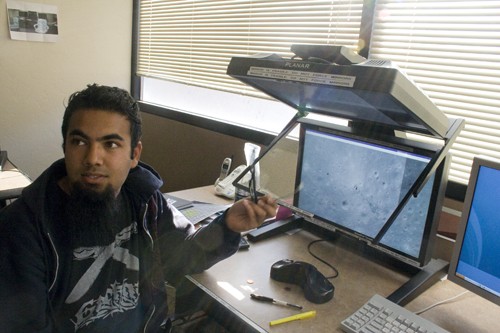Lujendra Ojha, a geosciences senior, found possible signs of liquid water on Mars through his research using a special high-resolution camera. About 700 undergraduates around the U.S. applied to present their research at the Posters on the Hill event in Washington, D.C., on April 13, and 74 students, including Ojha, were chosen.
Daily Wildcat: How did you come to find clues of habitation on Mars?
Ojha: An imaging team, including HiRISE (High Resolution Imaging Science Experiment) team members and NASA, takes images of Mars with the HiRISE camera. I took these images and made digital terrain models, where I looked at two images of the same place, creating a 3-D effect. I saw a “”flow feature”” on one image, and not the other. This led me to start looking for more of those features. I quickly gathered the observation that these features were only on the Southern Hemisphere and were forming at the time prudent for liquid brines to exist: during the summer.
How did the opportunity to present your research on Capitol Hill come about?
The Graduate and Professional Student Council has an annual showcase at the UA that displays research from different fields. My research won a first prize and an honorable president’s award. GPSC sent me an email about and event with the Council on Undergraduate Research, so I registered with CUR to present on Capitol Hill. Last week I heard a reply and found out I was accepted. CUR asked that I write to Arizona senators and representatives so they can see my research in Washington, which I plan to do.
How do you think this will affect the future of Mars research?
If what we found is really liquid brine flow on Mars, then we can look into the potential of that more seriously. Water on Mars has always been so debatable, but what we found is convincing. It gives us better understanding of dynamic and surfacial (sic) processes as to what is actually happening on Mars. People have had ideas that gullies, which are flow features, were found by water, but what’s new and exciting in present day is liquid water on Mars. The research is very promising.
How long have you been researching this?
I have been researching this for about a year and a half. My senior thesis is on this research, and I am working on getting the paper published.
How do you think finding clues of habitation on Mars will affect your own future?
It definitely helps my resume, and when I apply for graduate school it will show that I am actually involved in significant research. It is also personally satisfying because involvement in this type of research has been my dream since I moved from Nepal at age 15. I have always been interested in science, and I hope to one day be a planetary scientist.









